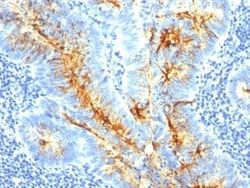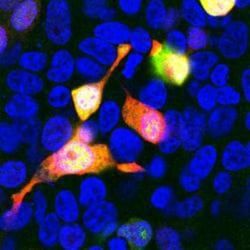TAG-72 Antibody (CC49), Novus Biologicals™
Manufacturer: Fischer Scientific
Select a Size
| Pack Size | SKU | Availability | Price |
|---|---|---|---|
| Each of 1 | NBP23138301-Each-of-1 | In Stock | ₹ 46,636.00 |
NBP23138301 - Each of 1
In Stock
Quantity
1
Base Price: ₹ 46,636.00
GST (18%): ₹ 8,394.48
Total Price: ₹ 55,030.48
Antigen
TAG-72
Classification
Monoclonal
Concentration
0.2mg/mL
Dilution
Western Blot 1:200-1:400, Flow Cytometry 0.5ug/million cells, ELISA 1-5ug/ml for coating, Immunocytochemistry/Immunofluorescence 1:100-1:200, Immunoprecipitation 1-2ug/500ug protein lysate, Immunohistochemistry-Paraffin 1:200-1:400, Immunohistochemistry-Frozen 1:200-1:400
Gene Alias
CA 72-4, Protein TAG-72, tag 72, tag-72 Protein TAG-72
Immunogen
Purified TAG-72 protein
Purification Method
Protein A purified
Regulatory Status
RUO
Gene ID (Entrez)
182875
Reconstitution
Protein A purified
Content And Storage
Store at 4C.
Isotype
IgG1 κ
Applications
Western Blot, Flow Cytometry, ELISA, Immunocytochemistry, Immunofluorescence, Immunoprecipitation, Immunohistochemistry (Paraffin)
Clone
CC49
Conjugate
Unconjugated
Formulation
PBS with 0.05% BSA. with 0.05% Sodium Azide
Host Species
Mouse
Molecular Weight of Antigen
220 kDa
Quantity
0.1 mg
Primary or Secondary
Primary
Test Specificity
Recognizes an oncofetal antigen of 220kDa, identified as a tumor-associated glycoprotein (TAG-72) with properties of a mucin. This MAb defines the mucin-carried sialylated-Tn epitope. TAG-72 is usually expressed by adenocarcinomas, but is negative in mesotheliomas. Studies have reported that this antibody has 80% sensitivity and 93% specificity for pulmonary adenocarcinoma. Therefore, TAG-72 is a useful marker to distinguish between mesothelioma and adenocarcinoma. However, false positive reactions can occur so results must be interpreted with the utmost caution. This antibody may be useful in the differentiation of non-small cell carcinomas from small cell carcinomas of the lung. The combined use of anti-TAG-72 and anti-GCDFP-15 is valuable in the diagnosis of apocrine carcinoma.
Target Species
Human, Rat, Bovine, Canine
Form
Purified
Description
- TAG-72 Monoclonal specifically detects TAG-72 in Human, Rat, Bovine, Canine samples
- It is validated for Immunohistochemistry, Immunohistochemistry-Paraffin.





